30 Nov 2017 | Asia and Pacific, Campaigns -- Featured, Maldives
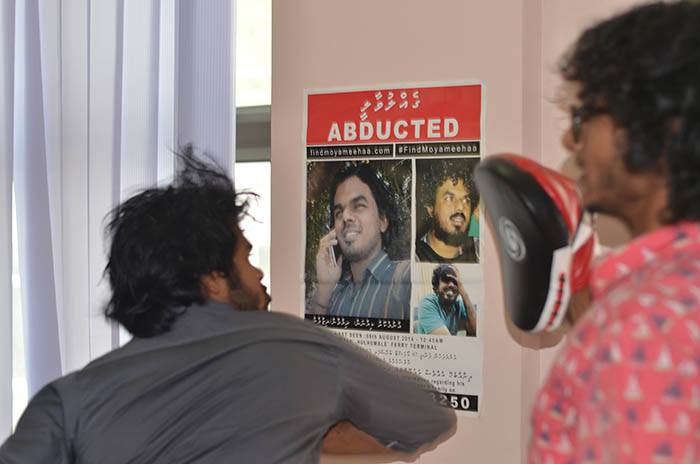
Staff at the Maldives Independent taking part in self-defence training.
“This award feels like a lifeline. Most of our challenges remain the same, but this recognition and the fellowship has renewed and strengthened our resolve to continue reporting, especially on the bleakest of days. Most importantly, we no longer feel so alone.”
– Zaheena Rasheed, former editor Maldives Independent, 2017 Journalism Fellow
Silence is the oppressor’s friend. Harassing those who speak out against corruption and injustice – like this year’s Freedom of Expression Awards Fellows Maldives Independent – is the favoured tool of those who seek to crush dissent. We cannot let the bullies win.
With your help, each year we are able to support writers, journalists and artists at the free speech front line – wherever they are in the world – through Index Fellowships. These remarkable individuals risk their freedom, their families and even their lives to speak out against injustice, censorship and threats to free expression.
I am writing now to ask you to support the Index Fellows. Your donation provides the support and recognition these outstanding individuals need to ensure their voices are heard despite the restrictions under which they are forced to live and work.
Your support will help award winners like Maldives Independent, which has continued to provide independent and critical journalism despite continued government pressure, threats of closure and the tragic murder of prominent liberal blogger and close friend of the Maldives Independent Yameen Rasheed in April, just a few days after the Freedom of Expression Awards 2017.
In spite of these challenges, Index has worked closely with Maldives Independent to help them to get on a better footing financially, to secure their office and staff, and to help them continue to hold power to account and expose wrongdoing and corruption in the country.
Reflecting on Index’s help, ex-editor Zaheena Rasheed said: “Sometimes you don’t realise how working in the kind of environment that we are working in and facing the kind of personal and professional challenges and losses that it, it can take a toll, and I think for me it [Index’s help] has been really helpful because I realise in many ways that I do need some help.”
I hope you will consider showing your support for free speech and the Index Fellows. A gift of £500 would support professional psychological assistance for a fellow; a gift of £100 helps them travel to speak at more public events. A gift of £50 helps us to be available for them around the clock. You can make your donation online now.
Please give what you can in the fight against censorship in 2018. Make your voice heard so that others can do the same.
Thank you for your support.
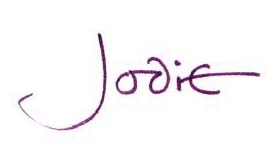
Jodie Ginsberg, CEO
P.S. The 2018 Index on Censorship awards will be held in April. To find out more about the awards including previous winners, please visit: https://www.indexoncensorship.org/fellowship
Index on Censorship is an international charity that promotes and defends the right to free expression. We publish the work of censored writers, journalists and artists, and monitor, and campaign against, censorship worldwide.
9 Nov 2017 | Asia and Pacific, Awards, China, Europe and Central Asia, Fellowship, Fellowship 2017, Maldives, News and features, Russia, Turkey
[vc_row][vc_column][vc_column_text]
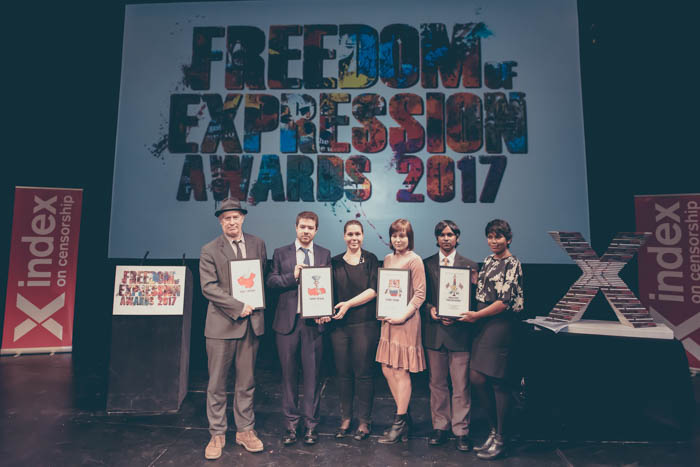
From left: Cartoonist Martin Rowson accepting the Arts Award on behalf of Chinese cartoonist Rebel Pepper; Alp Toker of Digital Activism Award-winner Turkey Blocks; Isik Mater of Digital Activism Award-winner Turkey Blocks; Anastasia Zotova, wife and campaign partner of Campaigning Award-winner Ildar Dadin; Ahmed Naish, deputy editor of Journalism Award-winning Maldives Independent; Zaheena Rasheed, former editor of Journalism Award-winning Maldives Independent. (Photo: Elina Kansikas for Index on Censorship)
Since the Index on Censorship Awards, the 2017 fellows have been busy doing important work in their respective fields to further their cause and for stronger freedom of expression around the world.
Rebel Pepper / Arts

Baby Pepper
Rebel Pepper, the Chinese cartoonist critical of the country’s government, now lives in exile in the USA where he works for Radio Free Asia. “Everything is going well, and I have a lot of friendly colleagues who like my work,” he told Index on Censorship.
He also continues to write his column in the Japanese version of Newsweek and worries about many recent developments in his home country. “The CCP’s control of society is becoming more and more severe, people are exposed to less and less real news from the outside world, and vice versa,” he says. “It’s hard to sum up because there are so many problems right now.”
The artist is still getting cartoons published and says the Index on Censorship award gave him the energy to “keep walking on the creative road”.
There is a new addition to the Rebel Pepper family, with baby Kitano. “Every day I have to change a lot of diapers, which has had a big influence on my sleeping patterns, so I have to find some fun from him,” Rebel Pepper tells Index, brandishing a cartoon to illustrate his point.
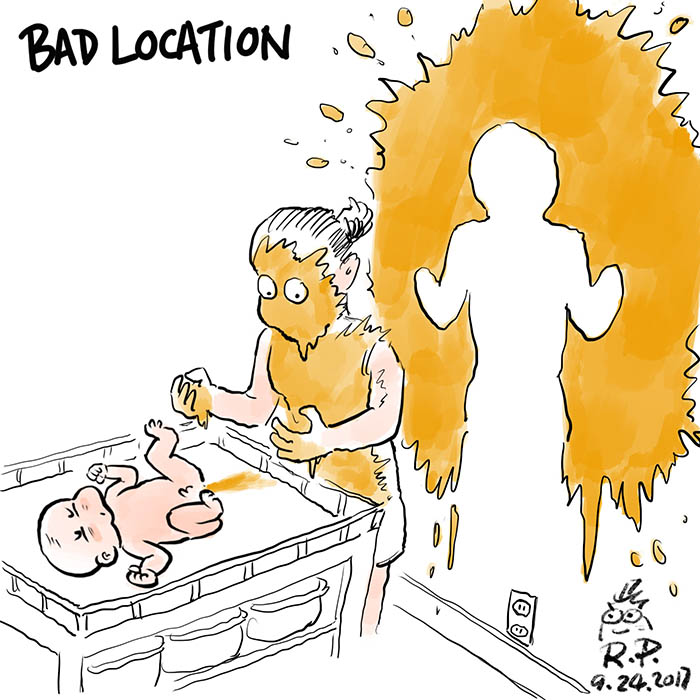
Idler Dadin / Campaigning
Campaigning fellow Ildar Dadin has returned to activism since his release from prison in February. “Along with friends or on single pickets, we are openly showing that we aren’t in agreement with what’s happening in the country,” Dadin tells Index.
Last month he was detained in St Petersburg while trying to film a woman being assaulted by police. “The situation in this country now is really bad,” Dadin says. “There’s a new kind of police force which can attack and humiliate people, which is very serious.”
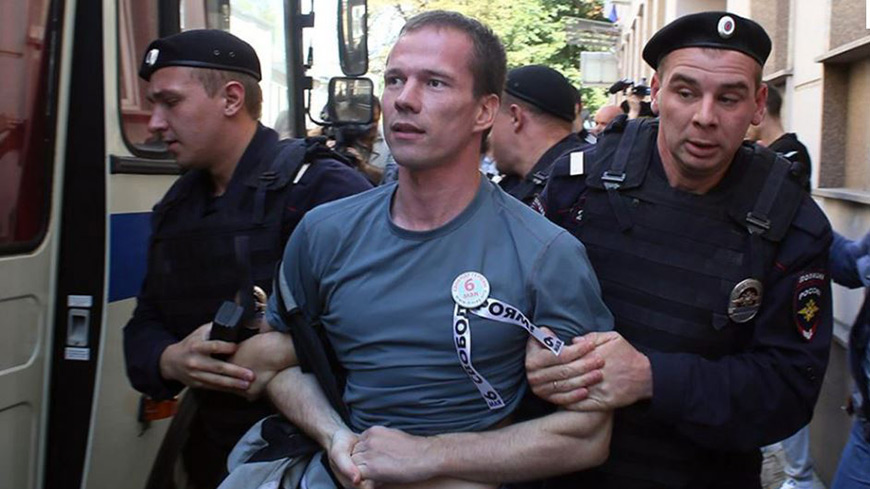
He describes the arrests of more than 260 people during anti-Putin protests across Russia — including St Petersburg — in October as “pretty much normal for any activist in the country”.
Dadin believes that pressure from civil society both in Russia and abroad were partially responsible for his release. He hopes for “justice for all people, not just Russians”.
Moving forward, Index is helping Dadin with his transition to life outside of prison and prioritising his health and also helping him to gain additional international exposure.
Turkey Blocks / Digital Activism
“We are now going to be the NetBlocks project and expand our work,” director of research at Turkey Blocks Isik Mater tells Index. The team are taking steps to formalise some of their tools and methodologies, expand into new regions that have similar needs and now cover several countries experimentally.
The Turkey Blocks team have also developed a new tool called Cost, which calculates the financial impact of mass-censorship. “Governments don’t tend to care about the human rights argument, so they don’t listen to it,” says Alp Toker, founder of Turkey Blocks. “But if you tell them ‘this will cost x million dollars of harm to GDP’ then they perk up because that can become a political issue, which is a very powerful method of convincing governments not to censor content.”
Turkey, however, has been quite quiet recently in terms of internet shutdowns, after a barrage of such incidents in the year following the attempted coup in July 2016. In fact, the Turkish government have been using Turkey Blocks data on internet shutdowns as a kind of audit, Toker explains. “We ran our first panel with the Turkish government just a few weeks ago, which is kind of historic,” he says. “We are seeing really positive things, and although they have a long way to go it should be noted that they’ve been willing to have a dialogue with civil society and with a human rights group.”
Index on Censorship is helping Turkey Blocks through the process of forming a board and incorporating public speaking training skills for Mater so that she too can begin to make more public appearances.
Maldives Independent / Journalism

Staff at the Maldives Independent taking part in self-defence training.
Journalism fellows at Maldives Independent are going through a period of change. Former editor Zaheena Rasheed left the publication soon after awards week in London to take up a position on the online team at Al Jazeera, where she has recently been doing a lot of work covering the Rohingya refugee crisis from Bangladesh.
For personal reasons, Rasheed finds it difficult to be involved with the Maldives on top of this. “A friend of ours in the Maldives, Yameen Rasheed, was murdered at the end of the Index awards week in London and that was a big blow — it was very hard for me.”
Yameen Rasheed was a prominent blogger and internet activist who died from multiple stab wounds after an attack in the stairway of his apartment building in Malé on Sunday 23 April 2017. Index on Censorship has been involved in helping the Maldives Independent better secure their personal and office safety since Yameen Rasheed’s murder, including a recent self-defence training session.
A new editor took over at the Maldives Independent in mid-September and since then the publication has seen a noticeable spike in readership, and reporters are encouraged to get out and meet people, build relationships and contacts.
“It’s fairly calm at the moment — there have been no coups, for example — so I see this period as a time to hone the team’s reporting and feature writing skills,” a staff member tells Index. “We’re doing a broad mix of news and features: politics, tourism, mental health, rave culture, the hipster coffee scene, rural development, sex abuse cover-ups.”
Staff at the Maldives Independent hope that the publication continues to be a forum for debate and free speech, that it holds power to account, exposes wrongdoing and corruption and most of all give insight into a country that many people have only one image of.
[/vc_column_text][/vc_column][/vc_row][vc_row][vc_column][vc_basic_grid post_type=”post” max_items=”4″ element_width=”6″ grid_id=”vc_gid:1510228913303-fd0d57c2-b760-1″][/vc_column][/vc_row]
27 Jul 2017 | Awards, Fellowship, Fellowship 2017, News and features
[vc_row][vc_column][vc_single_image image=”89552″ img_size=”full” add_caption=”yes” alignment=”center”][vc_separator color=”black”][vc_column_text]Following the Index on Censorship Freedom of Expression Awards in April, journalism award-winner Maldives Independent has undergone a period of change and restructuring.
Former editor Zaheena Rasheed credits the award with increased press coverage outside of the Maldives. Most significantly, Rasheed told Index that the attention from the award convinced their sponsors to continue funding them.
After an Al Jazeera documentary containing interviews with Rasheed was released, the Maldives Independent’s office was attacked and raided by police in September 2016 and Rasheed had to flee for her safety. She has since taken a role at Al Jazeera in Doha, Qatar.
“The job has been very busy, but exciting, especially following a diplomatic crisis between Qatar and its neighbours,” Rasheed told Index.
In late April, Yameen Rasheed, a prominent blogger and journalist, who had contributed opinion pieces in the Maldives Independent, was murdered. His death is still on the minds of those at Maldives Independent, which extensively covered the investigation into his murder.
“Yameen was a critical and brave voice who spoke out against injustice despite the crackdown on free speech. His murder has had a chilling effect on free speech in the Maldives and prompted many others to practice self-censorship. I believe he was targeted by religious extremists because of his advocacy for a more tolerant and secular society”, Rasheed said. No information has been released on the identities of the suspects in Rasheed’s murder or what charges they might face.
Maldives Independent journalist Ahmed Rilwan disappeared in August 2014. Despite the international attention these incidents have received, Rasheed is not confident that they will affect the culture of impunity that exists around attacks on critics and freethinkers.
“The biggest concern, as evident by Yameen’s murder and Rilwan’s disappearance, is that there are groups who are willing to kill in the name of Islam. They enjoy impunity because they have the protection of state bodies. State officials support them for two reasons; they think supporting radical groups bolsters their legitimacy, or they also subscribe to these views” Rasheed said.
Rasheed identifies the Maldives Independent’s biggest challenge is securing consistent and sufficient funding, something which Maldives Independent is working on now. [/vc_column_text][/vc_column][/vc_row][vc_row][vc_column][vc_basic_grid post_type=”post” max_items=”12″ style=”load-more” items_per_page=”4″ element_width=”6″ grid_id=”vc_gid:1509444026808-19a50408-3e9b-3″ taxonomies=”9028, 4002, 9136″][/vc_column][/vc_row]
21 Apr 2017 | Asia and Pacific, Digital Freedom, Europe and Central Asia, Event Reports, Maldives, News and features, Serbia
[vc_row][vc_column][vc_column_text]
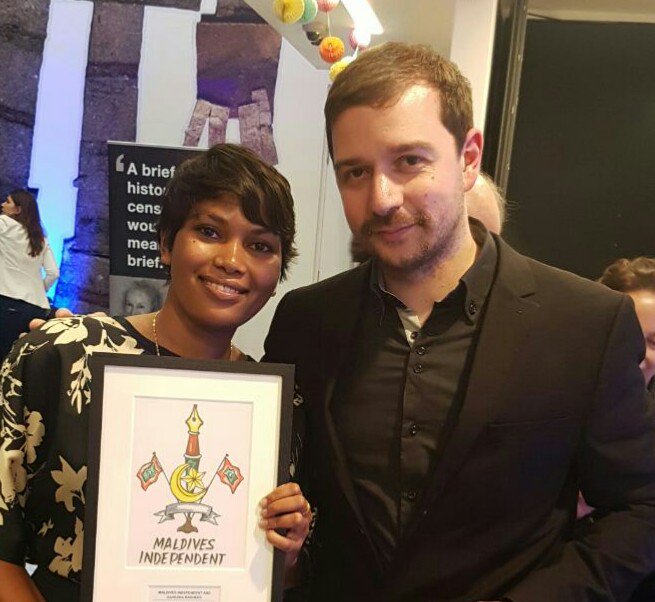
Maldives Independent’s former editor Zaheena Rasheed and KRIK editor-in-chief Stevan Dojcinovic. (Photo: KRIK)
Thousands of miles separate the Maldives from Serbia, but Zaheena Rasheed, the Index award-winning journalist and former editor of Maldives Independent, and Stevan Dojcinovic, editor-in-chief of the Serbian investigative website KRIK, but both described similar attacks on press freedom at a panel discussion at the Corinthia Hotel in London.
Rasheed lives in exile, having been forced to flee the Indian Ocean archipelago after working on an Al Jazeera documentary critical of the Maldivian government. She said she escaped just in time – a man who left a day later “barely made it out of the airport”.
Rasheed spoke of the intimidation tactics that independent news media had been subject to in the country. “Some newsrooms had gangs going inside of the newsroom and saying specifically we are not leaving until certain articles were taken down,” she said.
The Maldivian government claims that these gangs are criminals beyond their control.
As violence does not deter outlets like Maldives Independent from their investigative work, president Abdulla Yameen’s regime resorted to legal means, including imposing a draconian defamation law.
Rasheed said: “The definition of defamation is so broad that I could be sued for something I think, it doesn’t have to even be expressed. It could be a gesture. If it’s a gang or criminals after you, you can hide and avoid it, but when it’s the government you just can’t.”
On Serbia, Dojcinovic said that most in the West do not realise the extent of the country’s problems. “There’s not a real, clear picture of Serbia in the EU regarding how wild corruption and crime are,” he said.
Both journalists have seen hard-won democratic freedoms erode quickly. In Serbia this slide began in 2012 when Aleksandar Vučić was elected prime minister (this month, Vučić was also elected as the country’s president). Dojcinovic said: “The government has managed to destroy and undermine all of the democratic institutions built over 12 years within two years. We no longer have an independent judicial system and it’s the same with the media.”
In the Maldives, 2012 also left its mark. “Since the coup, a lot of democratic gains have been lost. What we saw in the first couple of years after the coup were physical assaults against journalists,” Rasheed said. “There were murder attempts, death threats and one TV station was even torched.”
She said that police turned a blind eye to these attacks. “All of the CCTV cameras were turned away from the building. The police just weren’t there.”
Whilst the threats are different in Serbia, Dojcinovic described a choked media landscape: “It’s not possible to see criticism of the government in the mainstream media. Not on any newsstand or on any TV frequency. They have destroyed all of these institutions.”
Dojcinovic said that the Serbian government is falling into the same patterns as Slobodan Milosevic’s regime: “It’s the arrests of journalists by the same group of people who were behind the murder of journalists back in the 1990s. They can’t cross this line now because it would ruin their reputation with the EU, so they find a way to make your life a nightmare without leaving fingerprints.”
Reprisals for his work have included three smear campaigns: he has been tagged as a criminal for his links to organised crime, branded a foreign agent, and had his personal life put on display.
“You cannot fight this much either because you can only publish on the internet,” Dojcinovic said. “That’s nothing compared to the newspapers which present us in this way.”
In the Maldives, however, there appears to be no such line. Rasheed said: “A member of our team was disappeared in 2014. Then a well-known gangster, who we think was involved in our colleague’s disappearance, vandalised the security cameras [at our office] and left a machete at our door. And then I got a text message saying: ‘You’re next.’”
Rasheed thinks that her colleague Ahmed Rilwan was targeted because he was seen to be in favour of secularism, and negative stories about Islamic radicalisation raise the government’s ire. “What really bothers them are these stories of growing radicalisation in the Maldives because that is what puts tourists off,” she said.
Rasheed also spoke about the difficulties of constantly fighting such repression. She told the audience that she had, to some extent, been traumatised by her experiences. However: “As a journalist, the most important thing to do is to live to tell the story.”[/vc_column_text][/vc_column][/vc_row][vc_row][vc_column][vc_basic_grid post_type=”post” max_items=”4″ element_width=”6″ grid_id=”vc_gid:1492769899588-d49a7ccf-cd47-5″ taxonomies=”8148, 9028, 8734″][/vc_column][/vc_row]







